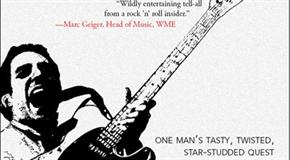Weissberg’s Still Off His Rocker
His former assistant, Mitzi Stone, still sends him regular “care packages” of Pollstar issues.
That shouldn’t be misinterpreted as an itch to get back to the day-to-day grind of negotiating fees, tending to persnickety artist demands and just plain working 12 hours a day, though.
Not that he wouldn’t entertain phone calls, he says. Music is in Weissberg’s blood. Every job he’s had in his adult life – journalist, radio DJ, and musician – has been connected, somehow. Retirement from the concert business just opened the door for Weissberg to fulfill a lifelong dream and his mother’s wish that he get a “real job” as a writer.
He’s penned a book, “Off My Rocker,” that is a paean to the concert business – with some names changed to protect the guilty – as much as a memoir.

Weissberg handles what could be touchy tales with grace and humor; there are no scores he cares to settle.
His beginnings as a Colorado music critic and journalist for publications including the Denver Post and Boulder Camera pay dividends in “Off My Rocker.”
The book is free of self-indulgent tendencies most music memoirs are guilty of. Weissberg’s humor and ability to tell a colorful story about colorful people – in the book he calls himself “a magnet for the crazy” – make his book a great read.
What started as a collection of fictionalized conversations with the late Otis Redding – Weissberg’s musical hero – began to take its current shape after he left Humphrey’s in 2006.
He credits William Morris Endeavor agent Marc Geiger as one of his circle of friends who insisted Weissberg finish the book.
He describes Geiger, who worked briefly at Humphrey’s while in college, as not only a friend but one of the few who gave him a leg up when he tried to bring Humphrey’s from a 650-capacity waterfront shed with a one-foot high stage to a favorite venue of fans and artists alike.
“We only worked together for six months before Regency Artists talked him out of San Diego and made him a senior agent at the age of 21,” Weissberg told Pollstar. “Geiger and I developed a real bond because there was finally someone sane in this office.
“In the early years when no one would take my calls, he told people about Humphrey’s and made some well-placed calls when he was at Regency,” which became Triad and eventually merged with William Morris.
Weissberg says those relationships helped him make the leap to booking national touring acts starting with Vince Gill, and gave him his first case of cold feet. “I was reluctant to put on concerts for more than a $20 ticket at that time,” Weissberg said.
“Then Clint Mitchell from William Morris started calling and offering me acts like Vince Gill. Of course I’d love to, but what would tickets cost? This was back in the late ‘80s and he said they’d have to cost $50.
“But he said people would pay more to see an act like that in an intimate situation like Humphrey’s. So I rolled the dice and went to [Humphrey’s owner] Richard Bartell – it’s his money – and said we’re going to go into new territory here.”
That successful gamble led to two shows with Willie Nelson, who told Rodney Crowell about the venue, who told Steve Winwood – his next-door neighbor in Nashville – and so on.
Weissberg says it’s the “symbiotic relationships” between himself, the venue and the artists who played there (and a supportive if often apprehensive owner) that made Humphrey’s a required stop for a list of superstars including Aretha Franklin, Whitney Houston, James Brown, Ray Charles, Fats Domino, Chuck Berry, Natalie Cole, Patti LaBelle, and Dionne Warwick – all of whom provide backstage fodder for “Off My Rocker.”
Weissberg credits Bartell with taking a chance on him, as well as helping extricate him from a cocaine-fueled business relationship that initially brought him to California, and making him a partner for “20 years together on a handshake.”
“Humphrey’s is now in its 32nd season. For a small independent venue, it’s almost an anomaly in this business of consolidation that a small independent is still standing after all these years,” Weissberg said. “In my run as a concert promoter I’m proudest that, even though my behavior in a lot of respects was rather bad, that in terms of dealing with agencies and artists, I was very forthcoming and honest,” Weissberg said.
“I have enjoyed adding ‘author’ to my resume. The feedback I’m getting from a lot of people (for the book) has been very positive. A lot of them ask what’s next. After the year of intense editing that went on before the book was released, I swore I would never write another word. But I’ve gotten over that.”
Despite writing a near-love letter to the music world, he’s also gotten over any itch to return to it, though he admits he misses it – and still pores over those box office reports.
“The best part of working in live music is when you get through with the negotiations and the demands, and people start filing into the venue. The show goes on, people go crazy. And I went crazy, too, for Roy Orbison and Whitney Houston’s debut performance.
“Those were shows that were transcendent. Despite all the headaches – Advil was part of my diet then – all of a sudden the music is there; it’s spectacular and you realize that you had something to do with bringing that to people, creating memories that live 20, 30 years later.”

So far, “Off My Rocker” is for sale through Amazon.com and bookstores in Weissberg’s home bases of San Diego and Boulder, where he says sales are doing well enough he and his publisher, Sandra Jonas, hope to get it on shelves nationwide. For more information please visit KennyWeissberg.com.
 Daily Pulse
Subscribe
Daily Pulse
Subscribe

